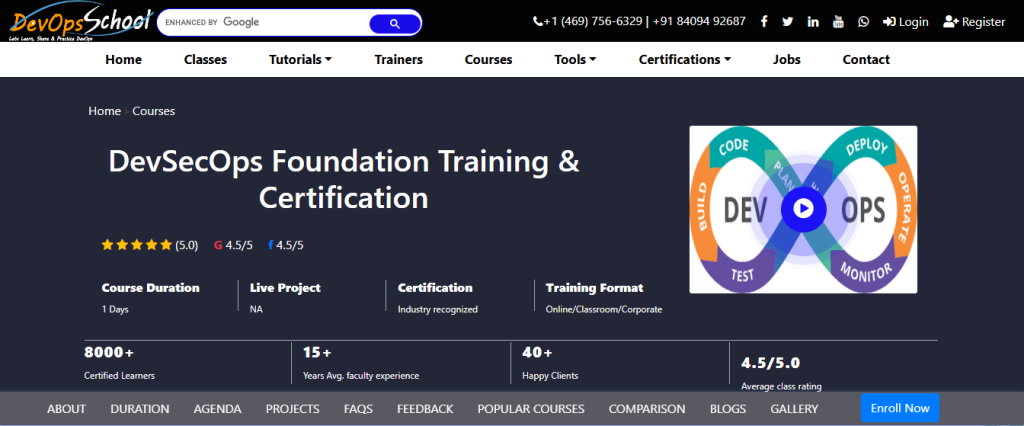
Introduction to DevSecOps Foundation Certification
- Overview: DevSecOps integrates security as a shared responsibility throughout the IT lifecycle, incorporating security practices into DevOps workflows. This certification focuses on securing software from development through to deployment.
- Certification Objective: To empower professionals with foundational knowledge of DevSecOps principles, tools, and security strategies required to maintain robust security in DevOps processes.
- Provider and Trainer Introduction: Highlight DevOpsSchool’s reputation for quality DevOps education and Rajesh Kumar’s expertise in DevSecOps training.
2. Target Audience
- Who Should Attend?: This certification is suitable for IT security professionals, developers, DevOps engineers, and systems administrators who aim to enhance security in CI/CD workflows.
- Prerequisites: Basic understanding of DevOps practices and familiarity with security fundamentals is beneficial but not mandatory.
3. Key Learning Outcomes
- Integrated Security Knowledge: Gain in-depth knowledge on integrating security at every stage of the DevOps lifecycle.
- Practical Skill Development: Develop skills to use DevSecOps tools, automate security testing, and embed security practices into CI/CD pipelines.
- Industry-Readiness: Acquire practical, hands-on experience that aligns with industry standards and best practices.
4. Certification Agenda
| Section | Sub-Section | Description |
|---|---|---|
| Understanding DevSecOps | What is Security? | Definition of security in development. |
| Why Security? | Importance of security in DevOps and risks involved. | |
| What is DevSecOps? | Overview of integrating security in DevOps practices. | |
| Types of Threats in DevOps | Discusses vulnerabilities, misconfigurations, and attacks. | |
| Why DevSecOps? | Benefits of incorporating security within DevOps. | |
| DevOps Security Best Practice Approach | Overview of Best Practices | Preventive, detective, and responsive security measures. |
| Security Concerns by Phase | Security considerations for each DevOps stage. | |
| Security Practice Recommendations | Best practices for CI/CD pipeline security, testing, and access controls. | |
| Recommended Tools | Suggested tools for security testing and monitoring. | |
| DevOps Security Phases | Static Application Security Testing (SAST) | Explains SAST for early code vulnerability identification. |
| Dynamic Application Security Testing (DAST) | Covers DAST for detecting runtime application vulnerabilities. | |
| Runtime Application Security Testing (RAST) | Describes RAST for monitoring application security in real-time. | |
| Database Security Scanning | Focuses on database security for data protection. | |
| Mobile Application Security Testing (MAST) | Discusses testing and securing mobile applications. | |
| DevSecOps Practices | With AWS | Security practices for AWS, including IAM, storage, and monitoring. |
| With Docker | Container security practices like image scanning and isolation. | |
| With Kubernetes | Best practices for securing Kubernetes clusters and resources. | |
| Implementing DevSecOps Tools | OWASP SonarQube for Code Scanning | Demonstration of SonarQube for integrating code scanning. |
| Chef InSpec for App & Infrastructure Scanning | Use of Chef InSpec for configuration and compliance checks. | |
| ELK with Kibana for Log Analysis | Utilizing ELK and Kibana for real-time threat monitoring. | |
| HashiCorp Vault for Secrets Management | Management of sensitive information like API keys and passwords. | |
| Fortify WebInspect (DAST) | Overview of Fortify WebInspect for automated DAST in web apps. | |
| Fortify Application Defender (RAST) | Real-time security with Fortify Application Defender for RAST. |
5. Certification Benefits
- Increased Career Opportunities: With DevSecOps in high demand, certification opens pathways to roles like Security Engineer, DevSecOps Engineer, and Compliance Manager.
- Industry-Recognized Skills: This certification validates your expertise in integrating security into DevOps workflows.
- Hands-On Training: Students gain experience with tools and processes, preparing them for real-world scenarios.
6. Training and Assessment Methodology
- Training Format: The course includes live sessions, labs, and assessments, available both online and offline.
- Evaluation: Includes quizzes, practical assignments, and a final exam to test knowledge.
- Certification Criteria: Successful completion of all modules and a passing score on the final exam are required.
7. Resources and Study Materials
- Core Materials: Comprehensive notes covering each module’s details, as well as documentation for all tools used.
- Supplementary Resources: Access to DevSecOps forums, online security repositories, and recommended reading for extended learning.
8. Certification Exam Details
- Exam Format: Multiple-choice questions, practical case studies, and tool-based exercises.
- Passing Criteria: Students must achieve a specific score for certification.
- Validity: This certification is valid indefinitely, though students are encouraged to stay updated on industry advancements.
9. How to Enroll
- Registration Process: Visit DevOpsSchool.com and follow the registration steps for DevSecOps Foundation Certification.
- Payment Methods and Refund Policy: Information on available payment options and refund eligibility.
10. About the Trainer
- Rajesh Kumar: An experienced DevSecOps practitioner and trainer, Rajesh Kumar brings extensive expertise in DevSecOps and security automation.
- Trainer’s Website: Additional resources and articles available at www.RajeshKumar.xyz.




